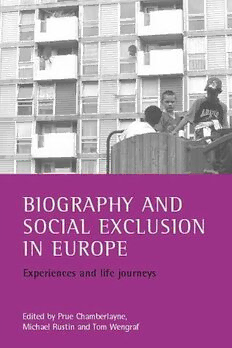
Biography and Social Exclusion in Europe: Experiences and Life Journeys PDF
350 Pages·2003·1.206 MB·English
Most books are stored in the elastic cloud where traffic is expensive. For this reason, we have a limit on daily download.
Preview Biography and Social Exclusion in Europe: Experiences and Life Journeys
Description:
Throughout Europe, standardised approaches to social policy and practice are being radically questioned and modified. Beginning from the narrative detail of individual lives, this book re-thinks welfare predicaments, emphasising gender, generation, ethnic and class implications of economic and social deregulation. Taking an innovative socio-biographical approach to comparative social policy, it argues that understanding individually differentiated biographical resources and strategies provides a bedrock for the appropriate training and effective practice of policy-makers, practitioners and researchers. Based on 250 life-story interviews in seven European Union countries, this work: analyses personal struggles against social exclusion to illuminate local milieus and changing welfare regimes and contexts; points to challenging new agendas for European politics and welfare, beyond the rhetoric of communitarianism and the New Deal; vividly illustrates the lived experience and environmental complexity working for and against structural processes of social exclusion; re-fashions the interpretive tradition as a teaching and research tool linking macro- and micro- realities. Students, academic teachers and professional trainers, practitioners, politicians, policy makers and researchers in applied and comparative welfare fields should all benefit from reading this book.
See more
The list of books you might like
Most books are stored in the elastic cloud where traffic is expensive. For this reason, we have a limit on daily download.
